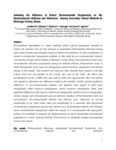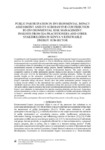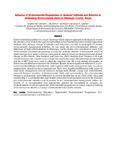| dc.description.abstract | Environmental degradation is a major challenge which requires appropriate strategies to reverse the situation. One of such strategies is experiential environmental education among high school students who, through change of attitudes and behavior, are able to participate in various environmental management activities. In this study the pro-environmental attitudes and behavior of high school students in Murang’a County, Kenya were examined to assess how environmental education programmes among the students affected environmental issues of waste management, water resources management, natural resources management and climate change in the schools. Nine hundred and sixty-one (961) students from nineteen (19) high schools from two sub-counties in the County was used in the study. The Likert type questionnaire and the 2-MEV Scale were used to collect the required data. The t-test statistic was applied to determine any differences between the variables. Results showed significant differences in pro-environmental attitudes and behavior with regard to solid waste management, water resources management, natural resources management. There were significant differences with regard to solid waste management, natural resources management, climate change and environmental concerns between members of Environmental Clubs and non-members. Pro-environmental attitudes and behavior were influenced by current membership of the Clubs rather than past membership. It is concluded that experiential environmental programmes improve the student’s pro-environmental attitudes and behavior hence environmental management within the schools. It is recommended that appropriate policies be formulated to enhance the implementation of school experiential environmental programmes to ensure capacity building of the learners to effectively manage environmental issues in the schools. | en_US |




